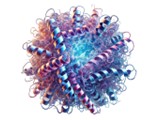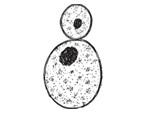Recombinant Proteins are proteins produced from recombinant DNA, a technology that allows the insertion of genes of interest into host systems such as bacteria, yeast, or mammalian cells. This method has revolutionized biomedical research and biotechnology by enabling the production of large quantities of proteins with specific functions.
Production Methods
The production of recombinant proteins follows a well-established process composed of the following steps:
- Gene Cloning: Inserting the gene coding for the target protein into an expression vector.
- Vector Transfection: Introducing the vector into a host cell for expression.
- Protein Expression: The host cell expresses the protein under the control of the vector's promoter.
- Purification: Recovery and purification of the produced protein through methods such as affinity or chromatography.
Expression Systems
Recombinant proteins can be produced in various systems, such as bacteria, yeast, and mammalian cells.
Applications
They have numerous applications, notably in scientific research, drug production, and industry.








